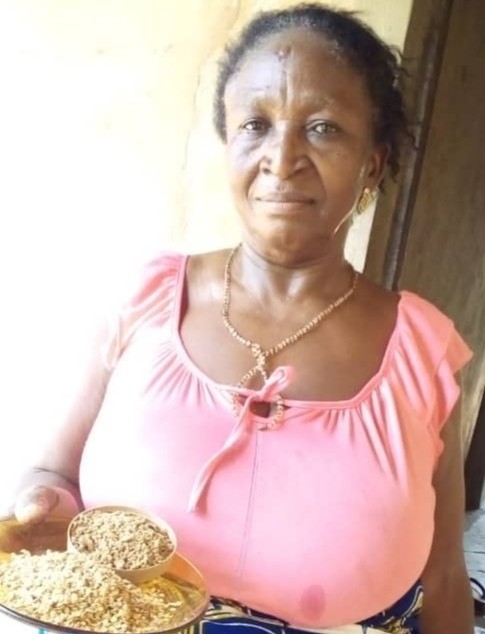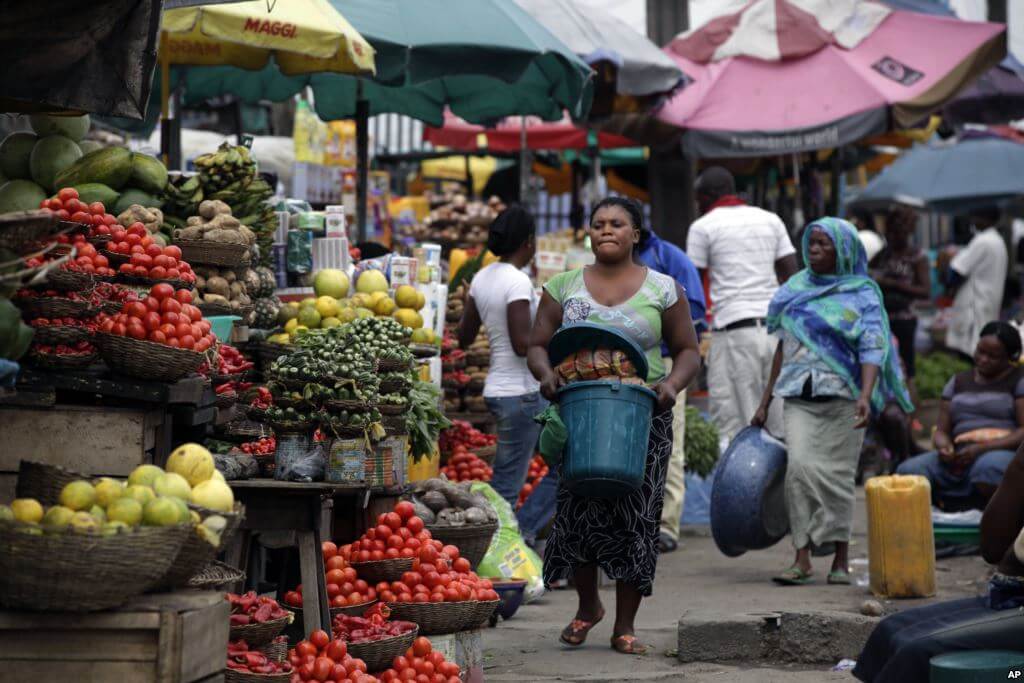Mrs Victoria Ozallor is from Enugu-Ezike in Igboeze North Local Government Area of Enugu State, but married at Ngwo in Enugu North Local Government Area of the state. The mother of six advises youths not to become “perpetual job seekers” but take advantage of agriculture and trade to create jobs for themselves.
She initially sought some white-collar jobs, but when it became clear to her that her dream job was not forthcoming, she resorted to farming Nsukka Yellow Pepper, popularly called Ose Nsukka.
Advertisement
All her children, according to her, were trained in the university, up to second degrees, from the proceeds of the pepper business which has become her family business for over thirty years. She also built her house from the same business.
THE WHISTLER gathered that Ose Nsukka has some nutritional, pecuniary and aromatic qualities which distinguish it from other pepper species in the world. Its aroma is next to none, while its spicy level is moderate and soothing.
Madam Ozallor said, “I’m from Nsukka. It’s called Ose Nsukka because it thrives very well on Nsukka soil, although it survives in other places outside Nsukka. The breed does not do well when it is nurtured with fertilisers. It does well only with animal manure, such as faeces of chicken, goats, pigs and cattle. If fertilisers are applied, everything about it will go.”
She said Ose Nsukka is cultivated around March during the beginning of the rainy season, but farmers who have access to irrigation can plant around August, adding that it requires adequate water. However, the planting this year did not yield like previous years, and the reasons are not yet known.
Advertisement
According to her, “Before, we used to harvest around six bags every four days from my farm, but the quantity reduced to about one bag this year. The weather hasn’t been favourable. This is the first time we are experiencing something like that. The leaves will suddenly become folded. We apply some drugs, but the recovery isn’t very fast.”
She said the long period of over thirty years that she has been in the business has been very fruitful. In her words, “I have six graduates with master’s degrees. Because there are no white-collar jobs, all of us are in the business. Even some of my children who have married are doing the same business in their various locations. From the proceeds, I built our house. The truth is that when God blesses one in the Ose Nsukka business, one can comfortably build upstairs from the proceeds. People should not become perpetual job-seekers when they can lease portions of land to engage in general pepper businesses, not specifically Ose Nsukka.”
She further said that Ose Nsukka is more expensive than other species in the market, because of its aroma, and warned that continued use of fertilisers in its plantation would destroy the pepper’s values. In her view, “They call it super agro. It will display much fruit but they instantly begin to perish before ripen. The difference is always clear because at the market, those that know will always line up to buy from some of us who do not use fertilisers.”
Our correspondent gathered that a painter of Ose Nsukka is sold for about N1000.00 only while the same size of other species costs N500.00. The prospect is currently being threatened by some red species being supplied from Benue State, which have reduced the price of Ose Nsukka below N1000 per painter because the Benue pepper comes in larger quantities and tastes good. It was found that a 100kg of Ose Nsukka sells for about N18, 000.
Other species of pepper in the market include Cameroun pepper. Madam Ozallor said, “The difference is that Cameroun pepper is spicier than Ose Nsukka. It wouldn’t have been spicier than Ose Nsukka if our people didn’t begin to use fertilisers in nurturing Ose Nsukka. I have a relative in Cameroun. She brought the seeds of Cameroun pepper to me, but it didn’t survive. But I will try again.”
Advertisement
There are two sources pertaining to why this special pepper breed is called Ose Nsukka, even at the international level. One of them claimed that a researcher at the University of Nigeria, Nsukka, crossbred two pepper species around 1960. A certain Prof MI Uguru was said to have worked with the researcher who did the cross-breeding after spotting it grow well in an Nsukka community.
However, another source claimed it was an accidental result: that farmers at Nsukka suddenly began to see the mutation, either because of cross pollination or something like that. The source said the attraction to the breed was because, apart from the aroma, it is equally resistant to infections, and again, it begins to produce after about three months of plantation, and that the harvesting can last up to six months in a favourable environment.
Another farmer, Eya Alice, from Ozalla Ezimo in Udenu Local Government Area, said, “I plant both Ose Nsukka and Tomato Nsukka. I have been in this business for over twenty years. We only use animal manure; not fertilisers to grow Ose Nsukka. Fertilisers make them rotten. Ose Nsukka is spicier and the aroma is special.”

She said she markets her products to buyers in Enugu and Onitsha. According to her, “Ose Nsukka recently began to have some diseases which were not there before. The cause of the problem is how people began to apply whatever they want to it. It has adversely affected our business. Its price is also higher than others. It is called Ose Nsukka because it originated from Nsukka, although it is planted in many places outside Nsukka climatic zone. We want government to help us with grants and loans. We want machines where we can grind Ose Nsukka to preserve, and also package for more values. Many people in Ezimo here plant Ose Nsukka. A basin of Ose Nsukka can sell up to N10, 000 while other species go for N5, 000.”
Dr Dan Ochi is the chairman of Nsukka Chamber of Commerce, Industries, Mines and Agriculture. He said plans were on for commercial production of Ose Nsukka to increase its commercial values, and also favourably compete with other pepper species globally.
Advertisement
In his words, “We have Cameroun pepper, as well as Ugadan pepper. But Ose Nsukka is different from all of them. While people go for Cameroun pepper is because it is highly pepperish. Again, nobody has seen it fresh. It comes here packaged. The advantage Ose Nsukka has is its unique aroma. We also have yellow pepper from Uganda. As it stands, we don’t know the colour of Cameroun pepper. In the international market, Cameroun and Ugandan peppers are more common. Ose Nsukka is hardly seen, but highly sought after.”
On the prospects of processing Ose Nsukka very soon, Dr Ochi said, “We have an order to supply 70 tonnes monthly to a factory in Onitsha for processing into spices. We have not even supplied them one tonne because we don’t have enough. We also have orders to supply 100 tonnes to somebody in the US using an off-taker in Lagos. I also understand that Hon Chinedu Onu, from Ezimo, has a plan to set up a factory to process Ose Nsukka. But the challenge will be how to get the quantities which the factory would utilise. Our long-term plan is actually to start processing the pepper. There is a China firm that we have gotten the contact. It’s about N13m to set up a pepper processing factory. There are plans, but the resources. And we want to make sure that there are commercial quantities to be able to supply the factory.”
He revealed that there are about 2, 000 people currently cultivating Ose Nsukka on a subsistence level, except, according to him, “One Thaddeus Mba who can boast of one hectare. But a lot of people are in the business at Uzo-Uwani, Lejja, Ohodo, Ezimo, etc. When we profiled them, we got about 733 people of them. In 2018, we advertised for those in the Ose Nsukka business to show up. We also have an Anchor Borrowers’ Programme. The CBN has given us a final approval, and also approved some money for us. It’s just that commercial banks are making it difficult for us to access. We have been able to switch over to a CBN-owned microfinance bank. Before the end of this year, we shall mobilise about 300 farmers to embark on commercial production of Ose Nsukka under the programme because we have our off-taker to buy any quantity produced. Again, CBN has recognised Ose Nsukka as a special product from Enugu State that can benefit from the Anchor Borrowers’ Programme. It has never happened before. What were allocated to Enugu State before were rice, cassava and cashew nuts. But now Nsukka yellow pepper is now included under this programme.”
An unsubstantiated claim says it is the same Ose Nsukka that is processed into Cameroun pepper, and packaged and supplied to Nigerians.



